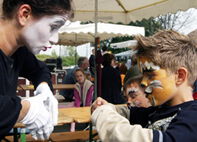I decide - you do
by Michael Stuhlmiller

A simple rule of the status game that can actually be really fun.
The only problem: Not everyone likes it, and not everyone wants it. Especially when a very specific feeling creeps in: "Someone wants to exert power over me, and I don't want to be dictated to."
But does that necessarily lead to an argument?
Wherever status relationships prevail, such as between parents and children, teachers and students, bosses and employees, this simple rule can very quickly end in conflict and lead to tedious arguments.
To give you an idea of what status play with children and young people can look like, and how you, as a clown, can use the rules of the status game to avoid arguments, I'd like to tell you a little anecdote.
I remember a particularly memorable experience with a little boy I met at a performance at an elementary school. Even during my performance, the boy stood out because he was constantly eyeing my props and constantly interrupting. It seemed as if the teachers viewed the clown performance more as an opportunity to take a well-deserved break than as a way to look after the children. This left me pretty much alone with the situation and saved myself by repeatedly assigning the "troublemaker" important tasks within the play, such as the function of a post in the tightrope walk or the role of bandmaster in operating the cassette recorder.
The real interaction, however, only began after the performance.
It turned out that the teachers considered the child a bully and alternately feared or rejected by the group. His behavior towards me reflected this. At first, he continued the "I'll steal your props" game and then proceeded to insult me. Only when I put my nose back on and looked at him with big clown eyes was I able to get his attention and stop him from scattering the rest of my props around the gym. It was to be expected that he would go for my nose first. Only my pathetic clown-like whining stopped him. Sure enough, he started whining himself, so we joined in a short chorus of whining together. That broke the ice.
Afterward, he began bossing me around, sending me alternately in one direction and then the other. Naturally, I followed the instructions of my high-status. However, the clown's manner of movement, speed, and variations of locomotion surprised the little man so much that he forgot his instructions because he was laughing so hard. By now, the other children had also become aware of it, this time accompanied by their teachers, and were interested in the little show. Some children supported me by demonstrating even crazier variations of locomotion. The more foolish I acted, the more reckless my teachers became. The little boy who started the game with me remained in charge the entire time. I repeatedly drew attention to him by asking him questions and appointing two other children as his assistants.
After a while, I let out a pitiful clown-like whine and whimper until the children asked me what was wrong. After some hesitation, I announced, primarily to "my high status," that I had to go home and that without their help, I would never be able to gather all my things and put them in the car. It was obvious who supervised the entire procedure and made sure I could leave. With a big "clown goodbye," I set off.
Even though this little interlude cost me some time before I could leave, the feeling of going home was particularly wonderful that day. I probably wouldn't have needed less time to persuade or threaten the little boy, and finally to involve the teachers so that I could find my hidden props. As in all other relationship games, I also go with the flow in the status game. And in this case, that flow was clearly the "offer" to be the low-status one and do everything the child wanted. The idea that we lose leadership and control if we hand over the reins to this little man misunderstands the child's real need. It's not about power or powerlessness, but simply about being answered. For this reason, the boy also agreed to cooperate. Although I essentially steered the game by asking questions and serving, in accordance with the status game rules, and thus leading the game exactly where it should go.
In my clown school, I dedicate an entire room to status. I call it the 3rd Room of Laughter.
In status, we learn that we always act in pairs: one on top and one on the bottom. That's why we also speak of high status and low status. The corresponding behaviors are then linked to this. The key is that a clown never associates it with a feeling of power or powerlessness and can therefore playfully switch from one role and from one side to the other.
Here, it's all about keeping the play flowing and not getting stuck in a misunderstood "I have to assert myself" and "I won't let this happen."
Because this creates fronts that ultimately make both sides losers.
